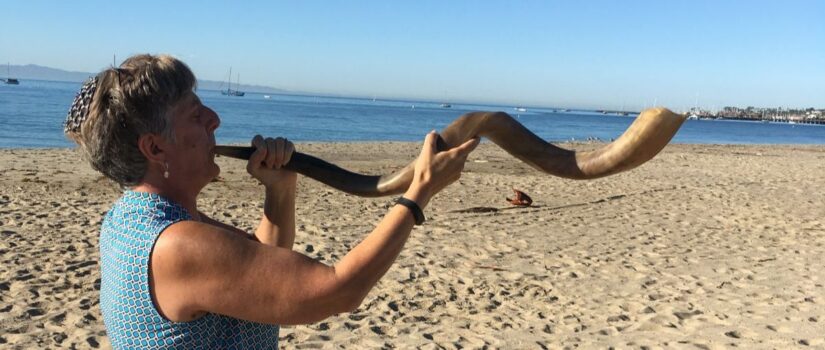Rabbi Jamie’s Corner
September 2023
We’ve asked Rabbi Jamie Hyams (our Development Director) to share her perspective with our community.
Late summer/early fall is a stressful time for many rabbis. The High Holy Days are only days away and it’s our busiest time of year. We are finishing the details of services, writing sermons, making sure we have enough Torah readers lined up. A congregational rabbi friend of mine fretted that with all the details that she has to track, she doesn’t have enough time to spiritually prepare herself for the holidays.
I can relate. The years I led services, I too often found it difficult to carve out spiritual space for myself. I was tasked with the sacred responsibility of creating space for the communal journey my congregants were undertaking. This year, I am planning to be a “Jew in the pew,” and I am experiencing a depth that is new to me. I am also experiencing the power of “unending love” for the first time.
When people ask where the idea for interest-free lending at Hebrew Free Loan comes from, we often speak of the biblical injunction in Exodus not to charge interest.* But our interest-free lending is permeated by a wide range of Jewish ideas and values, over and above the command in Exodus. The idea that we are a loving community, here to help when people are most in need, is expressed throughout Jewish liturgy, such as in this interpretation of Ahavat Olam (with abundant love).
We are loved by an unending love.
We are embraced by arms that find us even when we are hidden from ourselves.
We are supported by hands that uplift us even in the midst of a fall.
We are urged on by eyes that meet us even when we are too weak for meeting.
We are loved by an unending love.
Embraced, touched, soothed, and counseled…
Ours are the arms, the fingers, and the voices;
Ours are the hands, the eyes, the smiles.
We are loved by an unending love.
– Paraphrased from an interpretation by Rabbi Rami Shapiro
The High Holy Days, and the cycle of transformation that they enable, begin with the month of Elul that precedes Rosh Hashanah,** the Jewish new year. During Elul we are conscious that the new year is almost upon us, when the metaphoric gates of heaven will swing open, and that on Yom Kippur, ten days later, they will swing shut. Some of us rise each morning during Elul and blow our shofarot to awaken ourselves from the mundane rhythm of life and remind us that this is a time of opportunity. This 10-day period is time when our tradition affords us the opportunity to change the course of our lives, to put correctives into place that will hopefully make the coming year better.
Tradition teaches that God is close during Elul. Elul, spelled aleph, lamed, vav, lamed in Hebrew, is said to be an acronym for ani l’dodi v’dodi li, “I am my beloved’s, and they are mine.”*** For me, God is the impulse to do good, and is found in the connection between people. I have felt the warmth of this connection profoundly this summer.
My summer has been memorable, juggling lots of family transitions, some wonderful and some extremely stressful. A month ago, I tripped coming out of a funeral (yes, it would make a great Saturday Night Live skit), and I broke my foot. Suddenly I was grounded and dependent on others in ways that I had never experienced.
I had never really connected to the prayer “Ahavat Olam” until now. I thought it spoke of a powerful being up in the sky. But I now see it refers to the human acts of kindness that support others in times of need. When I fell and needed help for the most basic of things, the community stepped up (no pun intended). A shower chair and a scooter appeared, meals were dropped at our door, and I felt the closeness described above. I was supported literally and figuratively by “an unending love… by [the] hands that uplift us even in the midst of a fall.”
Transitions, expected or otherwise, are opportunities. They force us to examine our situations and change course. We don’t choose the cards we are dealt, but how we play them is in our control. Hebrew Free Loan is here to help people play the hands they are dealt to their best advantage. For example: a student loan that enables someone to finish medical school; a general needs loan that allows a person to spend precious time with a dying relative; or a loan that helps an entrepreneur start a business that will sustain their family … each of these is an expression of the unending love that is the foundation of Hebrew Free Loan.
This year, may you feel the embrace of unending love and the warmth of community.
Wishing you a happy, healthy, sweet new year.
~ Rabbi Jamie
*Exodus 22:24
**This year Rosh Hashanah begins Friday night, Sept 15.
***Song of Songs 6:3

